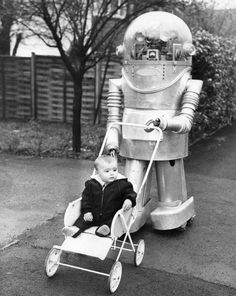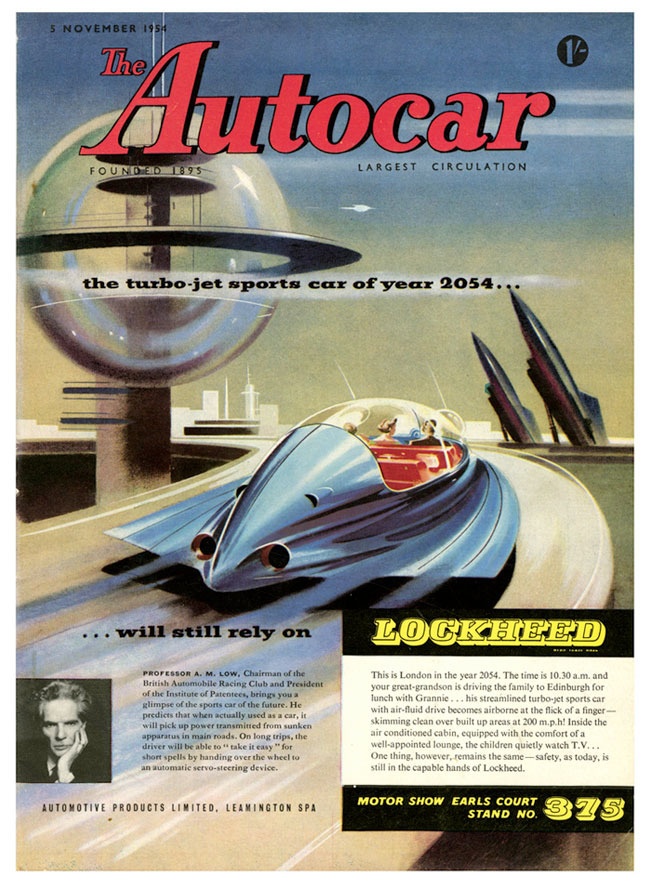

Posted on 06/06/2017 6:39:32 PM PDT by 2ndDivisionVet
The race to create self-driving cars is on—but what happens when they’re everywhere and nobody has to drive?
That could lead to a “passenger economy” worth $7 trillion by 2050, according to a new report by Intel and analyst firm Strategy Analytics.
While the name of the potential new market is lame, the amount of cash it's estimated to drive is not: the study predicts self-driving cars will free up 250 million hours of commuting time per year, providing the backbone for a thriving $800 billion industry by 2035, when the study predicts fully autonomous vehicles will begin to proliferate globally....
(Excerpt) Read more at mashable.com ...
“Bull. You have never lived in the country. It takes the police 10-15 minutes to get to my house.”
I’ve lived in the city and in the country. I’ve spent more time living in the Houston area than anywhere else. And most of that has been in a suburb that is 20-30 minutes from a freeway.
“Technology is making us poorer not richer.”
On average, yes. Big corporations are exploiting unjust patent laws to create continual monopolies. This makes the rich richer on the backs of consumers and taxpayers. But, keep in mind that markets allow the average person to participate somewhat in the profits of these companies. The bigger issue is that the standard of living is improved by technology. Or, at least it can be.
We have access to more food, more conveniences, etc. The average poor person has air conditioning, televisions, cell phones, cars. Kings of a few centuries ago did not have such luxuries. Their orchestras could not compete with the availability of every imaginable type of music that practically anyone can access anywhere, anytime.
But the world is far more corrupt than some of the simpler times. There has been an ebb and flow of morality down through the ages. So I’m not saying it was all rose gardens earlier. But there are definitely treacherous things happening all over the world right now.
So I’m not saying it is better.
“A car that is 99% autonomous is really no better than a car that is 0% autonomous.”
That’s not entirely true. Teslas are mostly autonomous now. They can speed up and slow down based on traffic conditions. They can change lanes on their own. They can park. They can almost drive themselves. These things are useful. They improve driving safety. They make driving easier, more convenient, and less stressful.
So far telecommuting has only been successful in a select number of industries. Only a fraction of the workforce has this option. Will this change? Who knows?
I predict that people will travel more and not less as self-driving vehicles become viable. People have many reasons to be mobile. They may want to meet up with other people with similar views, values, and interests who do not necessarily live close by. They may want to see sights. Or take vacations.
Look how the automobile has transformed the travel habits from two-hundred years ago. Now the average person can travel in ways that only the rich or powerful could in the past.
“I bet you don’t write software for a living.”
Used to. I’ve built custom shopping carts, event schedulers, contact management software, classified ads systems, and more. It’s been quite a while since I did any serious coding, but I’m knowledgeable. I keep up with technological trends.
“I see self-driving cars as the backdoor way to get the US to adopt European levels of citizen control.”
For leftists, everything is an opportunity to get more control over citizens. Technology is what you make of it.
“I’ll still opt for a 6-cylinder+, human-controlled car with self-drive assist.”
I share your feelings in general. I prefer to own. I’m just saying what I think is likely to happen.
Well, I’m a Texan.
I certainly relate. We prefer independence here.
I’ll try to maintain ownership of my own means of transportation as long as there is way to do so.
But I also see what is likely to happen in the future.
I don’t think these trends are going to diminish mobility. They will drastically increase it. People will be able to conveniently go anywhere, any time, cheaply, without sharing their rides in the way current public transportation requires.
The loss of control will probably take more of the form of tracking us. You may think Texans will resist this. But we aren’t resisting it now. Information about almost everyone is readily available for purchase. And it includes stuff we do not even know about ourselves. And this information is being used by the rich and powerful to control us NOW.
Look around. It is working.
What’s next, robot bloggers?
Entire websites of robots talking predictable blather to each other, occasionally sued by third party robots with hurt feelings.
It will be sort of like Canada on a larger scale.







I have my doubts about the drastically lowered costs. And, Americans rejected the metric system and elected Trump. Cars, to many, represent freedom, including the “freedom” to bend the rules a little (or a lot, at risk of being caught.) The degree to which that desire for freedom survives is the degree to which people will want cars under their own control, at least when that is desired.


Imagine your amusement when you get into the “car” and type in your destination, only to have the screen say, “I’m sorry, Dave. I can’t do that.”
The vehicle may question the need to venture forth, e.g.; “Only one passenger? Access denied.”
We are living in the future
I’ll tell you how I know
I read it in the paper
Fifteen years ago
We’re all driving rocket ships
And talking with our minds
And wearing turquoise jewelry
And standing in soup lines
We are standing in soup lines
Interesting reaction from many Freepers who insist they will never climb inside of a self-driving car and that they will cling to their old ways no matter what. These are the same people who probably vowed they would never use one of those confounded ATM machines or pay a bill on home computer back in the 1980s.
Speaking of home computers, I was one of the early adopters and there was a lot people who scoffed that I was throwing my money away on a hunk of junk. “Who the hell needs one of them computers in his house” they would say to me as they rattled their newspaper and reached for the remote to watch Dan Rather deliver the evening news.
Now these same old geezers are playing online blackjack on iPhones and watching Netflix on tablets and getting their news from a man named Drudge. The once trusted Dan Rather was destroyed by them online computer geeks and is now a pathetic bitter discredited washed up shriveled shell of a little man.
These self-driving cars are our future I’m afraid to say. Technology marches on. At some point in the future, our descendants will marvel at the fact that our society once allowed citizens to self-drive and hurtle about the countryside in two-ton metal death machines. To them, it will seem positively barbaric and medieval.
Fair enough.
I am sure you are aware of the Turing Test which people have claimed would be passed in the 'next 5 to 10 years' for the last 50.
How can one reasonably expect to create and deploy a fleet of fully autonomous cars when we can't yet approach passing the Turing Test ?
The question isn't whether they'd do worse. The question is whether the increased cost of the automated cars is going to improve these numbers sufficiently to make the technology viable from a purely financial standpoint.
I can tell you that there are some measures you can impose that would be a heck of a lot more cost-effective in reducing motor vehicle fatalities than "self-driving cars." I'll list three of them right here (and the third one sounds ridiculous on its face but would eliminate most of the problems with distracted drivers):
1. Seatbelt activation devices that automatically reduce speeds and/or disable the ignition system of the vehicle unless the seatbelts are used.
2. Speed restrictors on cars (limiting the maximum speed of every vehicle to 60 mph will reduce fatalities considerably; limiting it to a ludicrous 25 mph to eliminate in-vehicle fatalities almost entirely).
3. Outlaw the automatic transmission.
I work professionally in a field where I regularly deal with the highway infrastructure and traffic operational issues with advanced vehicle technology. I advise my clients that they are not likely to see a dramatic leap in the automotive paradigm (i.e., fully autonomous vehicles on the road) for decades.
As one of my industry peers astutely pointed out in a technical journal last year, we are probably going to remain in a state of limbo for a while -- where people either trust the autonomous vehicle technology too much (like the Tesla guy in Florida who gave the vehicle's detection technology more credit than it deserved and paid for it with his life) or too little (i.e., people won't trust it enough to pay a premium for those vehicles).
Something to keep in mind -- and I say this as a professional who deals with motor vehicle safety all the time -- is that making a car "safer" and more convenient to operate may actually make it less safe in the long run. This is why I suggested in my previous post that you could largely eliminate the problem with distracted driving simply by eliminating the automatic transmission. Take out the power brakes and power steering, and you'll find that drivers will have their attention highly focused on the task at hand.
Disclaimer: Opinions posted on Free Republic are those of the individual posters and do not necessarily represent the opinion of Free Republic or its management. All materials posted herein are protected by copyright law and the exemption for fair use of copyrighted works.